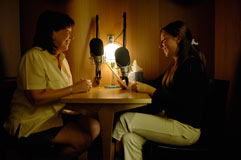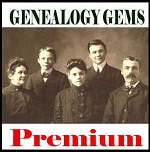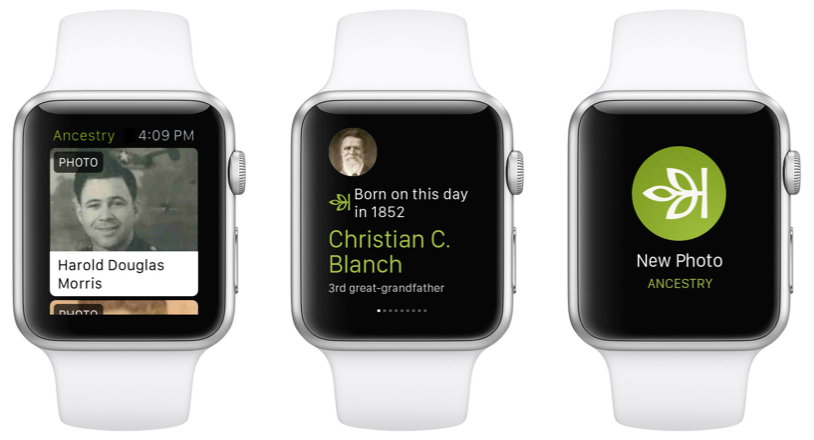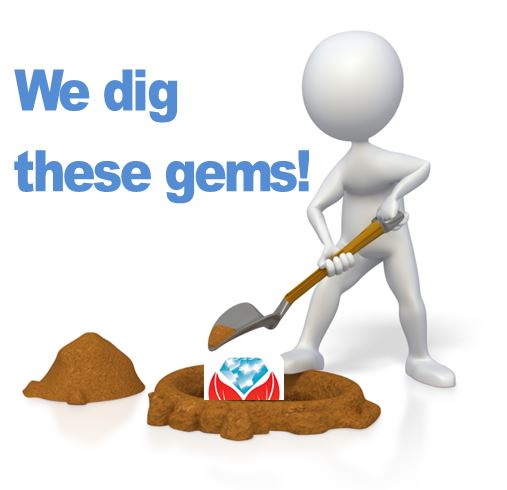Blog


Record a Life Story: Free StoryCorps App
 Recently a friend sent me a link to a TED talk by StoryCorps founder Dave Isay. As a radio broadcast journalist, Dave has spent his life capturing other people’s stories. The profound impact this had on him led him to found StoryCorps, which collects and archives interviews with everyday people.
Recently a friend sent me a link to a TED talk by StoryCorps founder Dave Isay. As a radio broadcast journalist, Dave has spent his life capturing other people’s stories. The profound impact this had on him led him to found StoryCorps, which collects and archives interviews with everyday people.
“Every life matters equally and infinitely,” Dave learned, something we discover as family historians, too. He talks about how inviting someone to talk about his or her life “may just turn out to be one of the most important moments in that person’s life, and in yours.” This is something I try to explain to people about family history interviews: asking respectful questions and listening just as respectfully is a gift we can give our relatives when we interview them.
StoryCorps started with a little recording booth in Grand Central Terminal, one of the busiest places in the world to hold these intimate conversations. Two people share a conversation, one interviewing and the other being interviewed, and a facilitator helps them record the conversation and leave with a copy of it. Another copy goes to the Library of Congress.
In our own ways, we do this when we record loved ones’ life stories. We honor their feelings, experiences and opinions by asking about them and preserving them. Sometimes we share personal moments of understanding, forgiveness or revelation. In my experience, it’s similar to what unfolds in the StoryCorps booths: “Amazing conversations happen.”
In Dave’s TED talk, he shares snippets of some of those amazing conversations, like A 12-year old boy with Asperger’s syndrome interviewing his mother, and a husband sharing his love for his wife: “Being married is like having a color television set. You never want to go back to black and white.”
 StoryCorps now has an app that helps people capture conversations like these. A digital facilitator walks you through the interview process, the app records the conversation, and then you can save and share the resulting audio file. Why not record an interview in honor of Mother’s Day or Father’s Day this spring with the StoryCorp app? Or have a meaningful conversation with an aunt or uncle, sibling, cousin or your child or grandchild.
StoryCorps now has an app that helps people capture conversations like these. A digital facilitator walks you through the interview process, the app records the conversation, and then you can save and share the resulting audio file. Why not record an interview in honor of Mother’s Day or Father’s Day this spring with the StoryCorp app? Or have a meaningful conversation with an aunt or uncle, sibling, cousin or your child or grandchild.
 Genealogy Gems Premium members can learn more about preserving the stories of your own life in the Genealogy Gems Premium Podcast Episode 116, in which I interview Laura Hedgecock, author of Memories of Me.
Genealogy Gems Premium members can learn more about preserving the stories of your own life in the Genealogy Gems Premium Podcast Episode 116, in which I interview Laura Hedgecock, author of Memories of Me.

Ancestry App for Apple Watch
 Ancestry’s new app for the Apple Watch brings new meaning to the idea of giving our ancestors “the time of day!”
Ancestry’s new app for the Apple Watch brings new meaning to the idea of giving our ancestors “the time of day!”
The Ancestry blog reports that while the Ancestry app for Apple Watch doesn’t offer full-service genealogy research capabilities on its small screen, you can do two major tasks:
“1. Get notified about important events in your family history. You can see important ‘on-this-day’ events in your family history including birthdays, anniversaries, and death dates of your direct ancestors and close relatives. Plus, we will let you know when we find records about a possible new parent or spouse, or birth, marriage, and death info missing from your tree.
2. Keep on top of new hints and comments. Take small steps to discover more about your family anytime, anywhere. A simple tap to review new hints or comment by voice dictation can enrich your family stories step by step. Within the watch app, you can scroll through a feed of meaningful hints, important dates from your tree, and comments about photos and stories. If there’s a hint that looks interesting, you can easily open right to it by pulling out your phone—if it’s a photo hint, you can save it to your tree directly from the watch.”
The latest version of the Ancestry iPhone app includes the watch app.
 Interestingly, responses posted to this news announcement seemed most excited about the ability to have fingertip access to family birthdays and events. This feature is already available (without having to purchase the Apple watch!) from MyHeritage: you can opt to receive text alerts for living relatives’ birthdays and anniversaries, along with any other family events you put on your own private family calendar. We blogged about it recently: check it out!
Interestingly, responses posted to this news announcement seemed most excited about the ability to have fingertip access to family birthdays and events. This feature is already available (without having to purchase the Apple watch!) from MyHeritage: you can opt to receive text alerts for living relatives’ birthdays and anniversaries, along with any other family events you put on your own private family calendar. We blogged about it recently: check it out!

We Dig These Gems: New Genealogy Records Online
 Every Friday, we highlight new genealogy records online. Scan these posts for content that may include your ancestors. Use these records to inspire your search for similar records elsewhere. Always check our Google tips at the end of each list: they are custom-crafted each week to give YOU one more tool in your genealogy toolbox.
Every Friday, we highlight new genealogy records online. Scan these posts for content that may include your ancestors. Use these records to inspire your search for similar records elsewhere. Always check our Google tips at the end of each list: they are custom-crafted each week to give YOU one more tool in your genealogy toolbox.
This week: British POWs in World War I, North Carolina marriages, and church records for the Evangelical Lutheran Church in America and various denominations in Scotland.
BRITISH POWs IN WWI. Prisoners Of War 1914-1920, with over 43,000 records with images at FindMyPast, consists of “10 series of British Foreign Office documents relating to prisoners held by the Ottomans during World War One. They not only include the names of military personnel taken prisoner–both allied and foreign–but also the names of civilians, merchant seamen, fishermen, diplomatic employees and more.” Some documents “contain the names, ranks and locations of PoWs and provide insights into life in the Ottoman camps. They contain details of requests made by inmates for items including footballs and biscuits, details of visits by foreign diplomats and reports on camp conditions.”
NORTH CAROLINA MARRIAGE RECORDS. Ancestry has a new collection of North Carolina “marriage bonds, licenses, certificates, and registers, as well as indexes and abstracts to the various records from 87 North Carolina counties….Of special interest to African American researchers are records of cohabitation, which were required to be recorded in 1866 in order for the marriages of recently emancipated slaves to be legally recognized.” The records span 1741-2011.
SCOTLAND CHURCH RECORDS. Births, baptisms, banns and marriages, deaths and burials are among a slew of newer records searchable on MyHeritage.com. According to the site, “The records in this collection were taken from Kirk Session material of the Church of Scotland, other Presbyterian churches, and also the registers of the Religious Society of Friends (Quakers). These parish registers cover a wide range of dates (from 17th to 19th century) and many of them are not to be found in any other record source.” Information listed in these records may include names, family relationships, dates and places of events and details of the parish.
U.S. LUTHERAN CHURCH RECORDS. Baptism, confirmation, marriage and burial records from more than 2000 congregations of the Evangelical Lutheran Church of America (1875-1940) are now on Ancestry. These have been available on Archives.com but have migrated to its parent site. “The information…varies from congregation to congregation (and sometimes from minister to minister). In some ethnic congregations, you may run into records in German, Danish, or some other language….Within the collection you may also find membership records, with some listing the names and dates of admission, communion records, and how they were received into the church.”

Google tip of the week: If you see a record collection online but don’t have a subscription to the website that hosts it, Google the name of the database. See whether a free site (like FamilySearch) or another site to which you do have access also hosts the same data set or a similar one. Can’t find it? Click on the description of the record collection (you can generally read the description even if you can’t search the records themselves) and read its source. It may come from a book or a resource that’s been microfilmed–something you can search for on WorldCat and borrow to a library near you. This tip is brought to you by The Genealogist’s Google Toolbox, 2nd edition–fully revised and updated in 2015!




